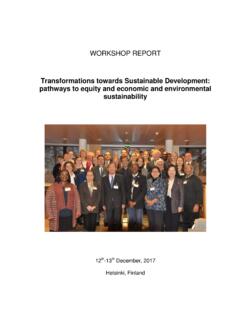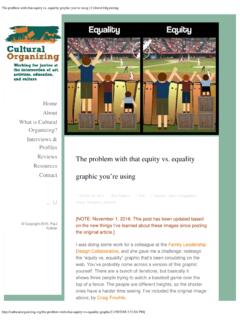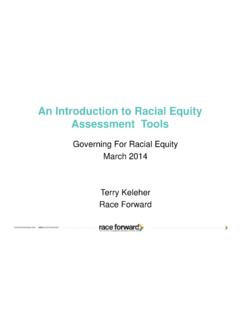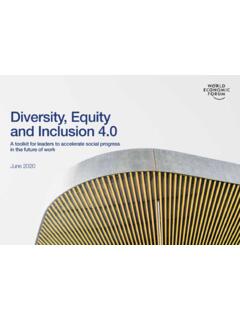Transcription of DIVERSITY, EQUITY AND INCLUSION POLICY - Caritas
1 diversity , EQUITY AND INCLUSION POLICY . Last updated 25 May 2021. Key Points Caritas Australia values human dignity by including everyone. Caritas Australia does not discriminate. Caritas Australia recognises that our differences make us stronger. 1. Why this POLICY exists At Caritas Australia, we are committed to promoting inclusive and equitable practices and the Catholic Social Teaching principles that recognise the inherent dignity of every person. This POLICY outlines our commitment to work in partnership with people with whom we engage. In particular, we are committed to individuals and groups who are vulnerable, marginalised and under-represented, to help empower them to be drivers of their own development and to inform our operations, programs and partnerships. In this POLICY Caritas Australia commits to respect, protect and promote internationally recognised human rights for all, regardless of race, religion, ethnicity, indigeneity, disability, age, displacement, caste, gender, gender identity, sexuality, sexual orientation, poverty, class or socio-economic status.
2 This includes our organisational commitments to gender equality and disability INCLUSION . 2. This POLICY applies to The commitments made in this POLICY apply to all aspects of Caritas Australia's operations, programs and partnerships, including our: Organisational culture and behaviour Development and humanitarian programs Learning and exchanges with Australian and international partners and other relevant people and organisations Work and communication with the Australian community 3. Definitions used in this POLICY Below is a partial list of definitions (see Appendix 1 for a full list). When we use we mean .. we, us, our Caritas Australia diversity We understand that each individual is unique and recognise the individual differences that all people bring to Caritas Australia. In line with ACFID's definition of diversity , these can be along dimensions of race, religion, ethnicity, indigeneity, disability, age, displacement, caste, Please always download the latest version from the website or intranet.
3 Printed or saved copies may be out-of-date. 1. gender, gender identity, sexuality, sexual orientation, poverty, class or socio-economic status. We recognise and promote diversity within Caritas Australia and see diversity as a strength that contributes to our organisational effectiveness. diversity is a complex issue, as identity aspects can be overlapping, fluid/changing and potentially invisible to others. Caritas Australia acknowledges that we are all different and this inherent diversity is valued as it brings opportunities and strengthens our organisation and our work. EQUITY At Caritas Australia we define EQUITY as fairness in access to resources and in the distribution of benefits from all the work we do. We take a human rights approach by making sure we treat people fairly in all the work that we do.
4 We believe, in line with the Australian Human Rights Commission, that human rights are not just about formal equality ,' which means treating everyone the same. It also involves substantive equality ,' which allows for beneficial treatment for some people, especially disadvantaged groups, so they can enjoy their human rights equally with others. INCLUSION Ensuring that all people, particularly those from vulnerable, marginalised and under-represented groups, actively participate and benefit from Caritas Australia's operations, programs and partnerships, regardless of their race, religion, ethnicity, indigeneity, disability, age, displacement, caste, gender, gender identity, sexuality, sexual orientation, poverty, class, socio-economic status or any other characteristics. We recognise the value of INCLUSION at all levels of our organisation from Board Members to grassroot participants, and enabling opportunity for participation in decision-making processes, so people are authors of their own development.
5 Caritas Australia strives to engage with everyone in the communities we work with through the program cycle and helps to empower all participants to engage in decision making, advocacy and providing opportunities for communication. 4. Guiding Principles Caritas Australia is guided by the principles of Catholic Social Teachings and the following specific principles in the promotion of diversity , EQUITY and INCLUSION : Impartiality and openness We serve people impartially, particularly those who are experiencing poverty and are most vulnerable, according to objective assessments of their situations and the needs they express, irrespective of race, religion, ethnicity, indigeneity, disability, age, displacement, caste, gender, gender identity, sexuality, sexual orientation, poverty, class or socio-economic status, indeed without adverse distinction of any kind.
6 Respect We recognise the value, dignity and diversity of each person. We respect religious traditions, culture, structures and customs in so far as they enhance and uphold the dignity of the human person. Please always download the latest version from the website or intranet. Printed or saved copies may be out-of-date. 2. Participation We ensure that people we serve are involved in the design, management and implementation of our work, including the projects we support and the associated decisions from assessment through to evaluation. Empowerment We help people develop and realise their full potential, and build mutually respectful relations, so they can control and improve their quality of life. Through integral human development and empowerment, we will promote active, powerful local communities with members playing a significant role in civil society.
7 equality We commit to the promotion of equal enjoyment of, and access to, rights, responsibilities, resources and opportunities. To achieve equality , we will work to ensure that the interests, needs and priorities of all people are taken into consideration, and that the barriers or discrimination to achieving these are removed. Subsidiarity We ensure that power, decisions and responsibility are devolved to the lowest level at which they can be properly exercised. In so doing we will strive to maximise and build upon local abilities and resources. 5. POLICY Commitments As an agent of positive social change and social justice, Caritas Australia is committed to the understanding and promotion of diversity , EQUITY and INCLUSION in all facets of our work - internationally, in Australia and within our organisation.
8 For this to happen, we will be accountable and commit to. Organisational culture and behaviour Maintain a culture of inclusive, safe and protective environments for all, including our employees, volunteers, contractors, partners and the communities and individuals we work with, particularly those most vulnerable to exclusion. Uphold a zero tolerance to, and take all reasonable and proportionate action to eliminate, any forms of violence, discrimination, harassment, abuse or victimisation. Value, promote and increase awareness of diversity and INCLUSION within work practices at all levels including decision making, planning, and employment. Have in place organisational policies and practices that reflect and respect the diversity within Caritas Australia, our partners and the communities we serve. Ensure all personnel understand, sign and comply with Caritas Australia's Code of Conduct and Professional Behaviour Standards for Protecting Children and Vulnerable People.
9 Create a diversity , EQUITY and INCLUSION Committee who will identify and prioritise diversity , EQUITY and INCLUSION initiatives across Caritas Australia for the purposes of improving Caritas Australia practices Working with partners on development and humanitarian programs Assess and manage the risk of exclusion and inequity in the course of our work in Australia and internationally and encourage and support partners to do the same in delivering aid and Please always download the latest version from the website or intranet. Printed or saved copies may be out-of-date. 3. development projects. Ensure assessments, contextual analysis, management and mitigation of risk, and our monitoring of these risks, address marginalised and vulnerable groups. Conduct, analyse and respond to monitoring and evaluation of our programs to track progress towards, and impact on, equality and empowerment and to ensure we avoid, at all costs, exacerbating inequalities.
10 Incorporate data disaggregated by gender, age and other relevant diversity factors. Undertake proactive analysis of EQUITY issues across all stages of the program cycle and use this knowledge to inform program planning and design and organisational practices. Share knowledge and practices within Caritas Australia, with partners and with broader stakeholders. Apply a twin track approach to programming that promotes EQUITY and INCLUSION by explicitly identifying specific actions for vulnerable people/groups in conjunction with mainstream INCLUSION . Recognise that the promotion of the principles and commitments in this POLICY contributes to all four outcome areas of Caritas Australia's Integral Human Development (IHD) Effectiveness Framework: life with dignity, just and peaceful relationships, sustained economic wellbeing and resilience, and influence and independence.







